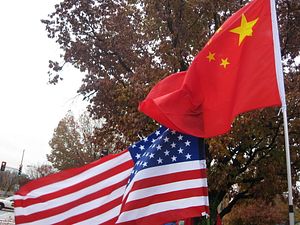Trans-Pacific View author Mercy Kuo regularly engages subject-matter experts, policy practitioners, and strategic thinkers across the globe for their diverse insights into U.S. Asia policy. This conversation with Ambassador Alfredo Toro Hardy – former Venezuelan ambassador to the United States, United Kingdom, Spain, Brazil, Singapore, Chile, and Ireland; visiting professor at the universities of Princeton, Brasilia, and Barcelona, two-time Rockefeller Foundation Bellagio Center resident scholar; and author of 20 books including newly published “China vs. the US: Who Will Prevail?” (World Scientific 2020) – is the 245th in “The Trans-Pacific View Insight Series.”
What is the core element underpinning U.S.-China rivalry?
The Cold War between the Soviet Union and the United States had an ideology as its core underpinning element. This emerging Cold War is not based on ideology, as China is not trying to sell the virtues of communism to anyone, not even to its own population. On the contrary, the rivalry between China and the U.S. is based on the capability shown by each of them to outmatch the other in terms of results. This means that the core element of the current Cold War is efficiency.
The United States was particularly well suited for an ideologically oriented Cold War. Having been the birthplace of modern democracy and its most devoted practitioner, it was easy to reclaim the leadership of the “Free World.” Especially so, as the Soviet regime embodied a missionary ideology. Conversely, the U.S. is badly prepared for a competition defined in terms of efficiency, as its political system is becoming increasingly dysfunctional.
China, on the other hand, has defined a clear-cut objective: Becoming number one by 2049. This not only strengthens the nationalistic resolve of its population and unifies the country under common banners but provides a clear sense of direction. Moreover, China can count on all the supportive elements offered to an authoritarian regime. This begins by the control of its population through technology. As shown by its control of COVID-19, a country of 1.3 billion people can exhibit the same result as Singapore or Denmark.
Why is the U.S. at a disadvantage within this rivalry?
In the past, the United States was split vertically by its multiple divides. This was consistent with the anti-majoritarian nature of its political system, as constructed by its Founding Fathers. Nowadays, however, partisan identities have merged with such divides generating two overwhelming majorities. These clearly differentiated majorities coexist side by side, demonizing each other. A dangerous horizontal split is detaching society and, in the process, gravely endangering institutional responsiveness. Not only decision-making is increasingly blocked, but zigzagging becomes unavoidable when irreconcilable societies compete for political power.
How is this rivalry reconfiguring the global order?
If efficiency defines the terms of the rivalry between the two behemoths of our time, the global order will tend to follow suit. The emerging Cold War will probably detach the globalized society into those attracted by an authoritarian but highly responsive system and a democratic but clearly unresponsive one.
A majority of Asian countries, within a continent which is home to half of the 20 fastest growing economies of the world and generates two-thirds of global growth, will be probably pushed towards the more efficient of the two. Particularly so, as China acts as an anchor economy and a connectivity and innovation platform for the rest of the region. As Asia, with China at its center, leads the 21st century’s economic growth, many will naturally flow towards it. Developing countries, to begin with, will tend to follow the most efficient system, which by definition would offer them greater opportunities. As efficiency becomes associated with authoritarianism, democracy will logically lose standing as a role model.
This association between authoritarianism and responsiveness, though, would pose a problem for many. Specifically for those reluctant or unprepared to go on their own, and yet not willing to sacrifice the benefits derived from efficiency nor ready to discard the values of democracy.
What is the impact of the China challenge on U.S.-EU relations?
The European Union fits well the latter description. For them, a country that in a short span of time has both produced the unilateralism of President George W. Bush plus the mixture of unilateralism and isolationism of President Donald Trump can no longer be trusted. Angela Merkel recognized as much in Aquisgran in May 2018. Europe is finding exceedingly difficult to tie its future to a country so prone to extremes and zigzags and, by extension, increasingly unresponsive.
A strategic alliance with China could not only bring steadiness and the economic and infrastructural integration of the Eurasian landmass, but also a hedge in relation to Russia. However, getting too close to China would imply legitimizing authoritarianism, which for some in Europe and particularly Germany, could become very troublesome.
Going on their own in a fractured world economy, while having to assume in their integrity the high costs of its defense, is not a rosy picture though. Particularly with an increasingly assertive Russia on its borders. This emerging Cold War could prove to be a true headache for Europeans.
Assess the post-U.S. presidential outcomes and implications for the future direction of U.S. policy towards China.
A new face in the White House may not change much. The rivalry between China and the U.S. has become structural and not simply conjectural. China aims at a position of leadership in world affairs and to a redefinition of its geopolitical footprint in Asia. For the United States, this represents an unacceptable challenge to its leadership. In the same manner in which an expansive Chinese nationalism sustains Xi Jinping’s assertiveness, popular sentiment and a wide domestic coalition upholds America’s reaction to such assertiveness. Under those circumstances, Trump’s departure would only put an end to the reality show, but not to the essence of the emerging Cold War.

































